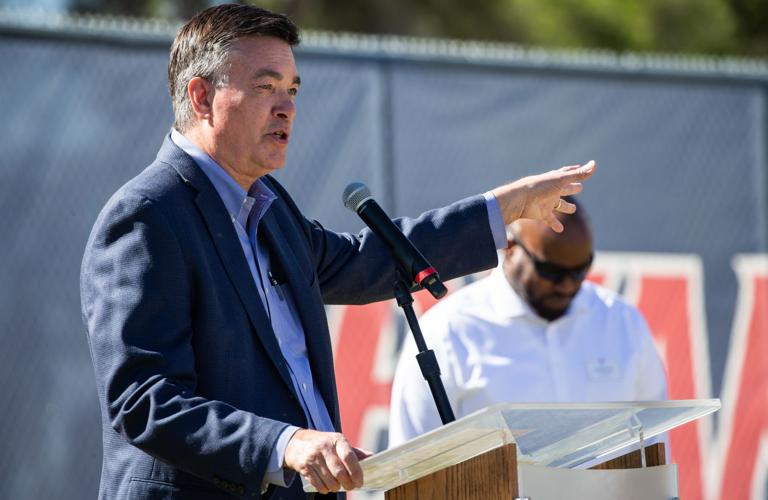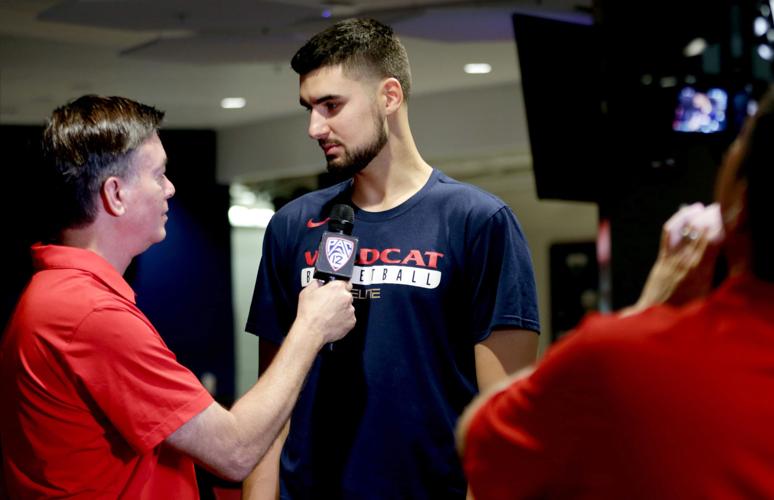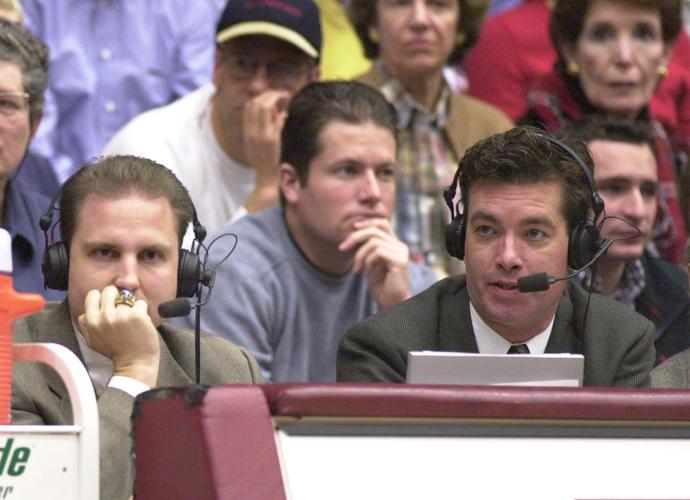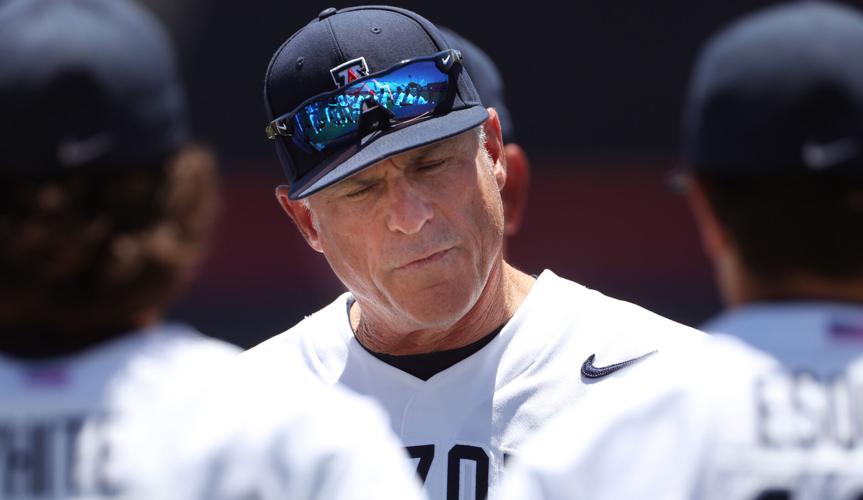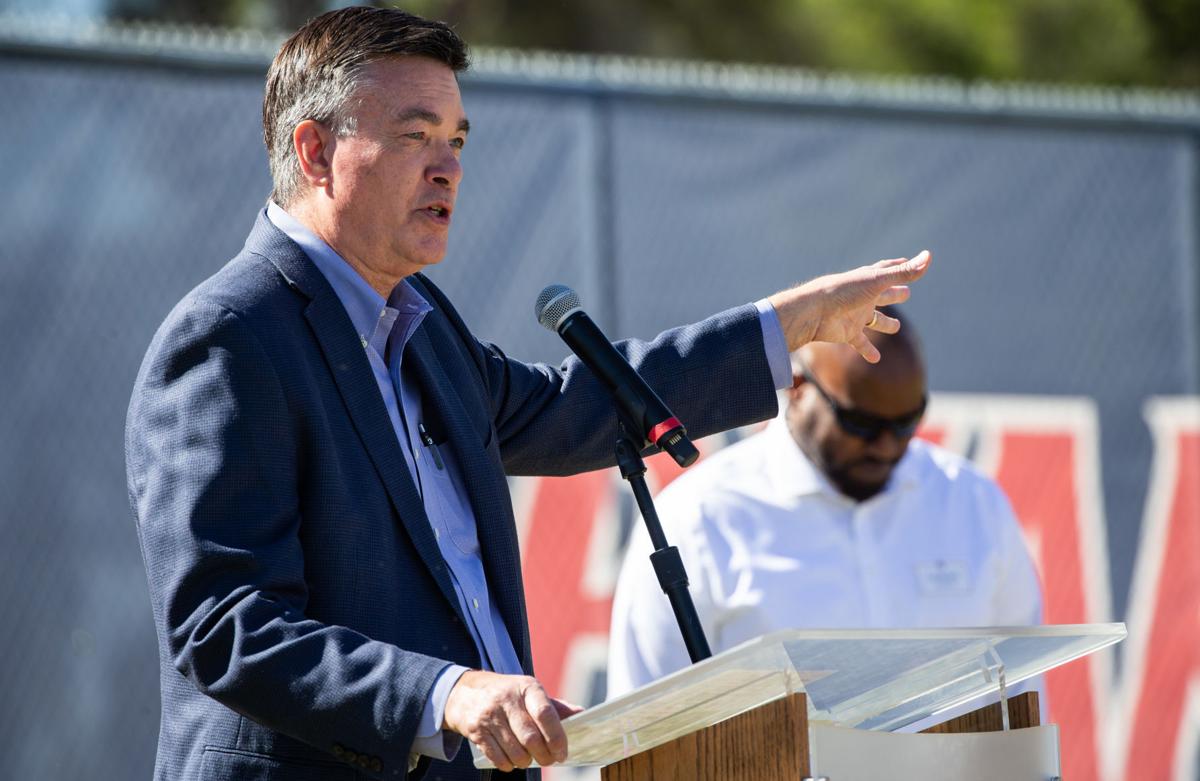FAYETTEVILLE, Ark. — Brian Jeffries has stories for days.
When you’ve been broadcasting Arizona Wildcats baseball, basketball and football games for almost 40 years, there’s no shortage of tales to tell.
Like the time, in 1985, when Arizona played in an NCAA baseball regional in Fresno, California. The hotel the Wildcats were assigned to wasn’t up to par.
“The whole trip was a disaster,” Jeffries said. “Jerry Kindall came walking out and said, ‘We’re not staying here.’ We got back on the bus.”
Or the time former Wildcat David Shermet taught Jeffries how to throw a baseball. Jeffries played basketball and ran track in high school. During the 1986 College World Series, he was shagging balls during a UA practice. He couldn’t get the ball back to the infield. Shermet set him straight.
“I’ll never forget him for that,” Jeffries said. “It didn’t rescue my baseball career. It was too late. But it was fun.”
Or the time Jeffries brought his infant daughter to practice one day, and Kindall treated her as if she were one of his grandchildren. Jeffries wasn’t surprised; Kindall always treated him like a son.
Both of Jeffries’ kids, Mckenzie and Brody, are out of the house now. Kindall died in 2017. One of his players, Chip Hale, is now Arizona’s coach. Jeffries, 69, is still going strong.
The UA’s director of broadcasting, whose radio calls can be heard on 1290-AM, sat down with the Star at the team hotel several hours before Friday’s regional opener against TCU. A portion of that conversation, which has been lightly edited, can be found below.
What appeals to you about college baseball?
A: “What I love about college baseball is watching the players grow up from when they arrive as freshmen until whenever they leave, be it a year or two years or four years or whatever it is.
“I just love the simplicity of the game. It’s not Major League Baseball. To me, it’s a calming experience. That sounds crazy. But after football and basketball, the calmness of going to the ballpark. I like to get there really early just to take it in.
“Three hours before the game, not much is going on. It just gives me this calming sense of reality. ... Just something about college baseball makes me feel good.”

Brian Jeffries, left, shown interviewing basketball player Dusan Ristic before Arizona's trip to Spain in 2017, has experienced all kinds of conditions covering UA baseball in NCAA regionals.
Unlike basketball and football, you work alone in the booth for baseball. How does that shape your approach?
A: “A lot more preparation goes into it. I have to have reams of material in case there’s fill time — and there always is in baseball. Growing up and listening to major-league announcers and talking to them, they always talked about repetition because you never know when someone’s tuning in. So you always want to make sure they know the situation.
“Filling in the gaps when a guy is not at the plate or there’s a visit to the mound, just having some material, that’s what I’m working on the last couple of days. I Google Fayetteville, Arkansas, to find out what the city is about because that’s just a talking point. I’ve been here once for a basketball game years ago, but I don’t remember anything about it. I’m assuming that most people listening never have been here before. So giving them a feel about where we are. ...
“I remember early on ... I got frustrated because I would do all this preparation, and the game would be over, and I’d look at my notes and realize I hadn’t used a bunch of that stuff. And I thought I was a failure.
“One of the guys I met was Dick Enberg when he was doing NBC, and I told him about that. He told me that he only uses 20% of the material that he prepares. OK, so I’m not crazy here. It’s OK to have stuff left over.”
You never know what the setup will be like at a regional. What’s the most unique or interesting setup you can remember?
A: “Oh, that’s easy. That was in Waco, Texas. I believe it was 1999. We played at Baylor. I remember going over the day before we played. The stadium was under construction. They were building a new stadium. It wasn’t done. There was no press box. There were no seats. It was just concrete. They built like a plywood platform at the top of the stands for the press box. I think there was a tarp over the top of us. The fans had to bring their own padded something to sit on. That was pretty crazy.
“We’re spoiled because Hi Corbett was built to handle the media. But a lot of college baseball stadiums are not. When you get into a regional like this, sometimes they’re not prepared to have four teams.
“These guys, it’s the SEC, so I’m assuming that all their stadiums are like this. They’ve got two dedicated radio booths, and everything’s good.
“Lafayette (Louisiana, in 2016), it was one press box. They put one radio (broadcaster) at one end, and one at the other, and then the guys in the middle were the PA announcer, scorekeeper, that sort of thing. So you’re all in the same room together. Which was kind of hard.
“The windows wouldn’t open. I had to snake the crowd mic under the door and put it out there so people could hear the ambiance, because otherwise it was totally quiet.”
Who were some of the baseball announcers who influenced you when you were growing up?
A: “Like everybody else, I listened to Vin Scully. Jack Buck with the Cardinals. I thought he was great. The guy that influenced me the most was Bob Robertson, who was the voice of the Tacoma triple-A team. (Jeffries grew up in Tacoma, Washington.) He also did Washington State for over 40 years. I listened to him all the time.
“I was about 14 years old, I think, and one of my best friends, we were sitting around talking one day. ‘What do you want to do when you grow up?’ I said I’d like to be like Bob Robertson. And he goes, ‘Well, he’s my next-door neighbor.’
“So I rode my bike over to Richard’s house almost every day. I didn’t have enough guts to knock on (Robertson’s) door. So ... I would wait in Richard’s front yard, hoping that Bob Robertson would come.
“Finally, one day, he pulls into his driveway and gets out of his car. I went over and, as best I could, introduced myself. And really, it started a lifelong friendship because he helped me almost until the day he passed away.”

Brian Jeffries, right, shown calling an Arizona basketball game in 2002, has chronicled UA baseball since the mid-1980s.
Do you use a different tone when calling a baseball game?
A: “Not consciously. The baseball announcers I admire most are the conversationalists, like Jon Miller from the Giants, for example. Scully was like that, where he’s just talking to you like you’re sitting in the same room.
“Baseball, there’s too many games; the games are too long. The exciting moments come, but the whole game isn’t filled with (them). Football or basketball ... there’s always something happening. Baseball, there’s all that time between the home runs or the strikeouts. So I would rather be more conversational.”
How do you straddle the line between fandom and objectivity?
A: “I think 99% of the people listening are probably U of A fans. I always keep that in mind. I want them to understand that I’m not outwardly rooting for the team, but I want to put the team in the best light possible. And I’m more enthused about their performance on the good side than the other team.
“Sometimes bad things happen. You’ve got to be able to deal with it. You can’t make excuses. You’ve got to tell it like it is.
“We’ve had games this year where things haven’t gone well. Arizona had two games at Oregon State where they easily could have won, and they didn’t. Well, why didn’t they? Because the bullpen gave up stuff late. I’ve got to be able to say that. ... I’ve got to be able to describe what I see.
“I think everyone understands, I’m a fan. I want to see the team do well. If the Wildcats are winning in any sport, the broadcast is always better. It’s an old saying amongst us in the industry that if the team’s winning, we’re doing a great job. But if we’re losing, the announcers are bad.”
Knowing that you started out calling his games when he was a player, how did it hit you when Chip Hale became Arizona’s coach?
A: “I was really happy because I knew how much he loved the U of A. It was his final destination. This is what he wants to do for the rest of his career. I didn’t know that he still owned a house in Tucson. That was the thing that surprised me because ... I don’t think I’d seen him in years. Probably because he was off doing Major League Baseball stuff. I was so happy that he was back.”

Arizona coach Chip Hale gets his Wildcats together for a pregame talk just before first pitch against USC at Hi Corbett Field on May 19, 2023.
Do the championship moments stand out the most?
A: “The championships are great. I think ’86, winning the regional in Austin, Texas, was pretty big because that’s a huge baseball school. I just remember beating them down there. That was one of those like, yeah, we’re just there to fill the bracket out. And then we won the darn thing, and they were in shock.
“In ’86, Tommy Hinzo, a la Nik McClaughry, stole home. We were at the old Rosenblatt (Stadium, in Omaha), and our broadcast booth was swung around towards first base. I was looking straight up the left field line. And here comes Hinzo, coming right at me.
“Anytime you win at all, you can’t beat that. Sometimes just getting there is pretty cool. The Starkville thing (Arizona’s Super Regional win in 2016) was great because, again, no one gave us (a chance). Everybody told me, anybody I knew said, ‘You can’t win in Starkville.’ To win two straight, that was pretty cool.”
What’s the most heartbreaking UA baseball game you’ve covered?
A: “I look at things differently. I look at the body of work. You get to the World Series, you’ve already won. If you don’t win it all, yeah, it’s sad. You’d rather win it all.
“It’s the same thing in basketball. I remember when people used to start complaining that Lute Olson only won one national championship. Or they had those first-round losses. They’re there every year. To me, that means more. Because once you get there, it’s almost like a crapshoot at that point. You never know what’s going to happen.
“Same thing in baseball. The fact these guys are here, that’s the victory.”
Arizona SS Nik McClaughry on the Wildcats making it into the NCAA Tournament and taking a “nothing to lose” approach to Fayetteville (video by Michael Lev / Arizona Daily Star)


